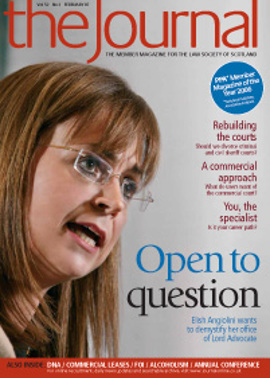Clean sheet at the Commercial Court

Since I was appointed as the principal commercial judge last September, I have been carrying out a review of the Commercial Court, at the request of the Lord President. The review was prompted by a decrease in the number of actions raised in the court in recent years. Although the decrease was not necessarily a matter for concern, it was appropriate to enquire into the reasons for it. The review has in addition provided a timely opportunity to take stock and ensure that our practices and procedures are as good as they can be.
As an initial step, I wrote to a number of solicitors, and to the Faculty of Advocates, inviting them to discuss matters with me. The solicitors included partners in some of the largest firms in Scotland, in smaller firms with commercial litigation practices, and in Scottish branches of commercial firms based principally in England. The Faculty of Advocates also responded at a senior level. In the light of the interviews, I also discussed matters relating to expenses with the Auditor of the Court of Session.
The results of the interviews have been discussed with the Consultative Committee on Commercial Actions, comprising representatives of the Law Society of Scotland, the Faculty of Advocates and commerce and industry. They shared my view that it would be desirable to hold a wider discussion.
I am delighted that the Lord President and the Scottish Executive Justice Department have both agreed to support the symposium on commercial actions to be held on 5 March (see panel).
The interviews
Those interviewed said that the decline in business was due to a combination of factors. More disputes than formerly were settled without litigation. Many construction disputes were now resolved by adjudication. Greater use was made of mediation. Specialised commercial courts had been established in some sheriffdoms. There were however also said to be aspects of procedure in the court which discouraged some litigants from using it. Although there were differences of opinion, one factor frequently mentioned was the pre-action protocol which came into effect in January 2005. Another factor was the relatively low rate of recovery of expenses. Other changes in the practices of the court were also suggested, with a view to reducing cost and delay.
The pre-action protocol
The general view was that pre-action correspondence was sensible, unless proceedings had to be raised as a matter of urgency. It was accepted that the protocol had resulted in some disputes being settled without proceedings, and that it had narrowed the issues in dispute in some other actions. The requirement to lodge a statement of the issues in dispute in time for the preliminary hearing was found to be useful.
At the same time, a number of concerns were raised:
The solicitor conducting the correspondence did so on the basis of his view of the issues. When counsel was instructed, counsel might take a different view, requiring the reopening of the correspondence.
Some solicitors were said to be adept at prolonging the correspondence. That tendency was encouraged if the court required every issue raised to be discussed.
In some cases, there had already been correspondence between in-house lawyers. Clients could be frustrated by the obligation to undertake additional legal correspondence.
Compliance with the protocol was expensive. The average cost was estimated by some interviewees at £10,000 (per party).
Some solicitors were under the impression that the cost of compliance was not recoverable under an award of judicial expenses, or that preparatory work done in order to comply with the protocol was particularly likely to be “taxed off”. It appears from my discussion with the Auditor that this is a misunderstanding.
The requirement to obtain and disclose an expert’s report in advance of raising the action caused expense and delay. There was also concern about the expert committing himself to a view at an early stage. Although expert advice would be required anyway in some cases, the protocol was understood to require the disclosure of reports (e.g. dealing with quantification) which would not otherwise have been obtained at that stage.
Some of these concerns suggest to me that the protocol is being applied more rigorously than necessary. There is a need to consider whether it ought to be clarified or refined.
Judicial expenses
A concern about the extent to which expenses in commercial actions are recoverable on taxation was mentioned by most of those interviewed. It was said that, whereas the rule of thumb used to be that two-thirds of expenses were recovered on taxation, the proportion in commercial cases was now about one-half. This enabled rich litigants to pressurise poorer ones, as well as being in itself a disincentive to use the court. The recovery rate was said to be much lower than in England, and this was a disincentive to clients who could choose their forum.
Further, the Table of Fees contained in the Rules of Court bore no relation to the fees actually charged for commercial litigation. The gap between actual costs and recoverable expenses was said to be greater than in other types of work, as solicitors tended to commit greater resources to commercial cases. That was partly because commercial cases were less repetitive than other types of case tended to be, and partly because commercial clients expected a level of preparation greater than that expected by most other types of client. The front-loaded nature of commercial procedure also had the consequence that more work was likely to be carried out prior to settlement than in other types of action.
One suggestion made was that there should be specific provision for commercial cases in the Table of Fees, rather than the present “one size fits all” approach. Another was that the Auditor should be given a wide discretion in commercial cases, and directed to have regard to the factors which might tend to increase the expense incurred.
In the light of the interviews, I discussed matters relating to expenses with the Auditor of Court. The Auditor accepted that the Table of Fees bore no relation to the fees actually charged by solicitors for commercial litigation. Even where an additional fee was allowed, the recovery rate was likely to be of the order of 60-70%. To some extent, the problem arose from the disparity between the Table of Fees and prevailing hourly rates: the costs allowed in England were closer to the fees actually charged. Another aspect of the problem was the inflexibility of the Table of Fees, and the necessity for an additional fee to be awarded before the Auditor could exercise his discretion so as to reflect the circumstances of the litigation in question. In that regard, the Auditor observed that the relevant rules in England gave the taxing master greater discretion.
The practice of the court
In addition to the matters already mentioned, a number of aspects of court practice were raised during the interviews, relating for example to ways of ensuring that judicial case management was always as effective as possible. I welcome these comments, and I am taking them on board. The Lord President and the commercial judges are committed to ensuring that the court provides as good a service as possible to the commercial community. We are always prepared to consider changes which may help us to improve our performance.
Another matter which was emphasised was the importance of avoiding delay in the issuing of opinions. Although this is not a general problem in the court, difficulties can arise from time to time. The workload of the court is heavy, but the purpose of having the court – to meet the needs of the commercial community – would be defeated if opinions were not produced promptly. At present, no writing time is built into the diaries of the commercial judges. Until recently, when commercial business did not proceed the judge was likely to be required to assist in disposing of other business. The judge was then liable to have non-commercial opinions to write, as well as any outstanding commercial opinions.
The Lord President has agreed that the time of the commercial judges should in future be ring-fenced so that they are not required for ordinary business during that time, even if commercial cases do not proceed, if they have opinions to write. If there is a shortage of judges which can only be resolved by using a commercial judge, the Lord President will decide where the greater priority lies.
The Lord President has also decided that the writing time of the commercial judges is to be settled by arrangement with the principal commercial judge. This requires a balance to be struck between the allowance of sufficient writing time to enable opinions to be issued promptly, and the avoidance of delay in the fixing of diets. Having discussed the matter with the consultative committee, I am aiming to keep vacations free of diets, so that they can be used principally for writing, but I have not so far made any allocation of writing time during term, since that would increase the waiting time for diets. I am instead relying at present on the discharge of diets to provide sufficient writing time during term. That approach will be kept under review in the light of experience.
ALL WELCOME ON 5 MARCH
The symposium on the Commercial Court will provide an opportunity for the commercial legal world to contribute to the review and to discuss the matters which I have described in the article (writes Lord Reed).
All those interested in commercial litigation in the Court of Session are welcome – whether judges, counsel, solicitors, academics, arbiters, mediators or, most importantly, members of the commercial community. This is an opportunity for the court to go out and listen to its users, and for its users to join in the discussion. The symposium will be hosted by the court and held at the Weston Link (the new extension to the National Galleries of Scotland, on the Mound in Edinburgh) on 5 March 2007.Admission will be by ticket, which can be obtained (free of charge) by applying to Mr Donald Bruton at dbruton@scotcourts.gov.uk . I hope that the event will be well attended.
In this issue
- Routes to qualification: the Italian picture
- Speaking of change
- Disabled from suing?
- Hearing and answering
- Court afresh
- Clean sheet at the Commercial Court
- Making a specialism pay
- LCN DNA - devil in the detail
- To buy or not to buy?
- Just a winter warmer?
- Views from the new boy
- Working out time
- A claim in trust
- Incapable of dismissal?
- Chasing debts made simple?
- Scottish Solicitors' Discipline Tribunal
- Website reviews
- Book reviews
- FOISA goes to court
- On the wrong track?






